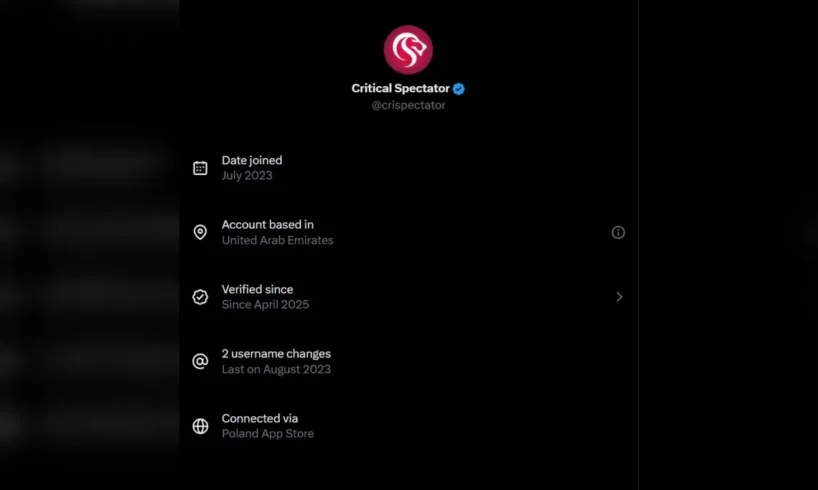
SINGAPORE – On Nov 23, social media platform X rolled out a new feature that makes public where an account is based.
It sparked a firestorm in the US and around the world, with concerns raised about potential foreign interference.
Among other things, the new “About This Account” feature showed that many accounts which were supposedly American were
operating from countries like India or Nigeria
.
Some of these accounts have hundreds of thousands of followers, with many posting about domestic policies.
One of them, @TRUMP_ARMY_, with almost 600,000 followers, commented extensively on things like immigration, with one post in 2024 calling illegal immigration the greatest threat to the US.
After being revealed to be operating from India, the account quickly changed tack, positioning itself as “an Indian who loves America, President Trump, Musk!”
The Straits Times examined 12 X accounts of pages that have commented frequently on Singapore’s policies and politics, and found that most of them appeared to be based elsewhere.
One account, by the Critical Spectator, was found to be based in the United Arab Emirates and was deleted shortly after the release of the new feature.
The feature was first announced by X product head Nikita Bier on Oct 15.
He said it aims to reduce inauthentic engagement on the platform by exposing these details.
This allows users to make a more informed decision about whether they are interacting with a bad actor that may be trying to incite tensions or spread misinformation.
“This is an important first step to securing the integrity of the global town square,” he said.
“We plan to provide many more ways for users to verify the authenticity of the content they see on X.”
Accounts with grey check marks, indicating that they belong to a government organisation or official, or a multilateral one, are exempted from having their locations displayed, he added.
While Mr Bier described the accuracy as being “nearly 99.99 per cent”, X did not provide any information as to which data sources it pulls from to pinpoint a user’s location.
There have been some disparities between where users claim to be and the location data provided by X.
This has led to accusations of deception, with some users being accused of being foreign agents.
Mr Oleg Ishanov, the director of threat research at cyber-security firm Acronis, said although the platform can make an educated guess, the process is not completely foolproof.
He explained that tech platforms tap a number of data points, including a user’s IP address and which country’s app store an app was downloaded from, to derive the user’s location.
This is reasonably accurate, but not 100 per cent, he told ST.
Factors such as a user travelling outside the country or the use of a virtual private network (VPN) may affect the location shown.
But for the most part, the roll-out of the feature appears to be a strategic move by X, said Mr Ishanov.
He said: “By bringing more information to users, they get to make the final decision whether an account should be trusted. Greater responsibility is now on the end-user.”
ST examined a dozen X accounts of pages that frequently comment on Singapore, including those that have been issued orders under the Protection from Online Falsehoods and Manipulation Act.
Of these, three were shown to be based in Singapore, although X showed that one of them was connected through the Indonesian Android app.
Each account would show a different location, depending on which platform the app was downloaded from, said Mr Ishanov.
App stores also generally separate users by country or region, he added.
However, this information will not necessarily show where an individual is based, citing how an expatriate may have downloaded the X app from their home country’s app store, but live elsewhere in the globe.
“For the average user though, this info will be close to the truth,” he said.
Meanwhile, accounts suspected of using a proxy to connect, such as a VPN, will show a message indicating their country or region may not be accurate.
This information is accompanied by an exclamation mark, with X acknowledging that some internet service providers may use proxies without any action on the user’s part.
Most of the accounts matched information that is already publicly known, such as The Inquiry, run by former Singaporean
Zulfikar Mohamad Shariff
, being based out of Australia, where he is now a citizen.
Accounts tied to The Online Citizen (TOC) editor Terry Xu, comprising TOC, Gutzy Asia, and Heidoh, were all
based out of Taiwan
, where he lives.
However, the account belonging to the Critical Spectator was deleted shortly after the new feature was introduced.
Checks by ST on Nov 24 showed that the account was based out of the United Arab Emirates, and connected through the Polish app store.
Run by Polish national Michal Piotr Pietrusinski, who also goes by Michael Petraeus, the online platform publishes commentaries on Singapore politics, with its most recent one on Nov 21 asserting that founding Prime Minister Lee Kuan Yew’s final wish was to preserve his
residence at 38 Oxley Road
.
On Nov 25, a search for the profile on X showed that the account no longer exists, with the social media link provided on the Critical Spectator’s website also redirecting to the same error message.
Aside from the 12, other X accounts that frequently post about Singapore appear to be based elsewhere.
The accounts LeeKuanYewRespecter and Lee Kuan Yew Geopolitics, which carry posts of the late prime minister’s quotes and photos, are based in Australia and India respectively.
Being based overseas and commenting on Singapore politics is not necessarily wrong, however, said Singapore Management University Assistant Professor Benjamin Joshua Ong, who teaches law.
“It is true that as the saying goes, ‘Singaporean matters are ultimately for Singaporeans to decide’, but there is nothing wrong with those Singaporeans considering input from foreigners when deciding,” he said.
What is unacceptable is if deception is involved, such as when a social media user pretends to be Singaporean despite being a foreigner, or if the user posts false or deliberately misleading statements, sometimes at the behest of others.
Attempting to exert control over governmental affairs here, rather than simply looking to persuade Singaporeans, would also be a problem, he added.
Prof Ong said: “Social media platform operators have responsibilities.
“After all, they are the ones who purport to control what can and can’t be posted on their platforms, and they are often responsible for deciding what content users see, what content is given prominence, what content attention is drawn to.
“But readers must be discerning too.”





